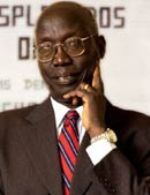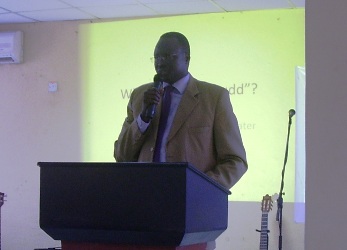South Sudan vows “massive support” to new UN representative Francis Deng
September 4, 2012 (JUBA) – South Sudan on Tuesday pledged massive leadership support to the country’s newly appointed permanent representative to the United Nations, Francis Mading Deng.

He has held other high ranking assignments including having been an ambassador to Canada, the United States and Scandinavia. He was the Special Advisor to the Secretary General of the United Nations on the prevention of Genocide Affairs, before accepting the appointment as South Sudan’s first permanent ambassador to the United Nations representing the world’s youngest nation.
Tor Deng Mawien, a presidential advisor on decentralization affairs lauded President Kiir for appointing Ambassador Deng, describing it as a “wise decision at the right time”.
Mawien considers appointment of Former Special Advisor to the Secretary General of the United Nations on the Prevention of Genocide as “placing the right person in the right place” as he would be able to use his contacts and connections to promote relations of the new nation with other UN member states.
“We really need to be there. We need our voices to be heard. So the appointment of Francis Mading [Deng] will help us a lot because he is familiar with how UN runs their affairs”, Mawien said on Tuesday
Majak D’ Agoot, the country’s Deputy Minister of Defence told Sudan Tribune on Monday that he also welcomed Deng’s appointment, describing him as “not an just an ordinary diplomat” due to his vast experience.

Minister D’ Agoot argued against voices opposed to Deng’s appointment, who were unhappy that he did stayed neutral during the civil war between the SPLM rebels, who now govern the Republic of South Sudan and the Khartoum regime.
Luka Biong Deng, another leading member of South Sudan’s governing Sudan People’s Liberation Movement (SPLM) said the appointment of ambassador Deng shows his commitment to the building of the new nation. He congratulated President Kiir for what he described one of the “most strategic decisions taken by our leadership”.
“It will provide him opportunity of using his wealth of experience and connections to improve the image of the South and to show to the people of the South that he is not only for building a new nation but to use his remaining energy to serve his nation”, Luka Biong Deng told Sudan Tribune on Monday in e-mail message from the United States.
South Sudan became a member of the UN last year, just a few weeks after it seceded from Sudan, following a self-determination referendum that was overwhelmingly in favour of separation. The vote was a key pre-condition in the 2005 Comprehensive Peace Agreement (CPA), which ended over two decades of war between the former SPLM rebels who now govern South Sudan and the Sudanese government in Khartoum.
He explained that Ambassador Francis Deng like the SPLM’s late leader Dr. John Garang believed in the vision “New Sudan” that a united, federal, secular, democratic Sudan which recognised the the diversity of all Sudanese and treated them equally would be in the best interest of the whole country – so long as it was not at the expense of the aspirations of the South Sudanese people.
In the 2005 Comprehensive Peace Agreement Garang ensured that South Sudan was given the option to secede after a period of 6 years power and wealth sharing with Khartoum’s National Congress Party. South Sudan overwhelmingly chose independence in a referendum in January 2011 and officially became the Republic of South Sudan on 9 July 2011 and was quickly accepted as a member of the UN, African Union and other international bodies.
“Francis’ writings,” Biong said, “have focused on projecting the uniqueness of the South as [a] source of his pride and how he looks at global issues. We are lucky having him on board during this difficult time of our nation building and I hope our government will facilitate him and provide him with [a] conducive environment to serve best our people.”
Despite six years of sharing power, South Sudan seceded from Sudan in July 2011 with many issues still unresolved including the demarcation of the fertile and oil-rich border, the status of the contested area of Abyei, a mechanism to replace the 50:50 split of South Sudan’s oil during the peace deal, as well as security issues related to armed SPLM members from the Sudanese states of Blue Nile and South Kordofan.
For the last year the SPLM North has been fighting the Khartoum government after the Sudanese military attempted to disarm them before protocols relating to the their areas were fully implemented. Khartoum now accuses Juba of continuing to back their former colleagues.
Juba denies this and accuses Khartoum of backing South Sudanese rebellions. The two sides fought a brief border war in April this year over the oil-rich Heglig region and relations remain tense despite a break through on the oil dispute in August meaning that exports through Sudan are expected to resume within the next six months.
(ST)
